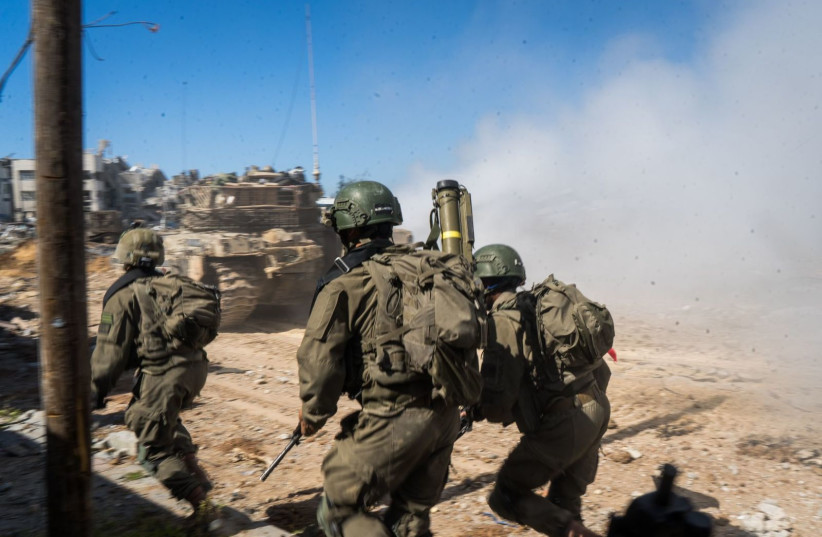A new survey conducted by the Jewish People’s Policy Institute revealed that two-thirds of Israelis think that the IDF should attack Hezbollah with full force, as well as shed light on other sentiments in the Israeli public about peace with the Palestinians and faith in the government post-October 7.
According to the survey, 63% of Israelis believe that Israel should attack Hezbollah with full force at the first available opportunity or after the war. Of those surveyed, 79% of the Israeli public believes there is no chance for peace with the Palestinians, and 44% think that the government, the IDF, and the Shin Bet (Israel Security Agency) have equal and shared responsibility for the October 7 failure.
This survey was taken five months after the October attack and the evacuation of the residents of the north from their homes on March 24.
"One of the profound results of the attack on October 7 is a sharp drop in the confidence of the Israeli public in the possibility of a political solution to the conflict. The same goes for the conduct of the war in the north (therefore, 63% believe that Israel must initiate an attack against Hezbollah) and so with regard to the post-war era (79% believe that there is no chance of peace with the Palestinians in the foreseeable future). Hamas convinced Israelis to make a decision and give up on a deal," stated Prof. Yedidia Stern, president of the Jewish People's Policy Institute.
Two-thirds of Israelis believe that Israel should attack Hezbollah and damage the organization's ability to threaten the residents of the north, but are divided as to the timing. Approximately 29% believe that Hezbollah should be attacked in Lebanon as soon as possible, 34% support an attack in Lebanon after the end of the campaign in Gaza, and 28% prefer continuing to strive for a political arrangement that will prevent military escalation in the north.

The gap on this issue between the supporters of the coalition, who tend to side with the attack, and the supporters of the opposition, who prefer a political solution, is clear. A large majority of voters of the coalition parties support an immediate attack (40%) or a later attack (41%) at the end of the campaign in Gaza. In contrast, a small majority of the voters of the opposition parties (51%) support the pursuit of a political settlement.
Relations with Palestinians
On the subject of relations with Palestinians, 79% of Jews and 39% of Arabs agree that "there is no chance of a peace agreement in the foreseeable future." Among the voters of the coalition parties, there is widespread support for strengthening Israeli control over the Palestinians, expanding settlements, and annexing territories, while opposition supporters tend to favor separation from the Palestinians or the pursuit of a political agreement.
Alternatively, 43% of Jews agreed with the statement, "In the end, there is no alternative to a long-term peace agreement with the Palestinians," with most of those respondents being voters of opposition parties in Israeli general elections. Among respondents who voted for coalition parties, only 14% agreed with this statement.
Additionally, according to the survey, about one-third of Jews in Israel believe that Israel should increase its control over the Palestinians and consider the dissolution of the PA and annexing the West Bank.
Another third believes that Israel should strive for separation from Palestinians while increasing security in the territory it already controls.
Responsibility for October 7
When asked about responsibility for not preventing October 7, 44% of respondents believed that the government, IDF, and Shin Bet share equal responsibility.. 31% believe that the responsibility falls on the IDF and the Shin Bet, while 20% think that the responsibility falls on the government only.
According to Shmuel Rosner, the editor of the survey, "The months that have passed since the beginning of the war, and publications revealing new information since then, about the days and hours preceding the Hamas attack in the south of the country have brought about a change
In the public's position on the division of responsibility for the "failure" between the political and military ranks. In March, we repeated the exact wording of the responsibility question that appeared in the institute's survey in November, about a month after it the war began. The answers indicate a decrease in the proportion of Israelis who place sole responsibility on the government, a slight increase in the proportion of Israelis who place primary responsibility on the IDF and Shin Bet, and an increase In the rate of the Israelis who place joint responsibility on the government and the army.'
Public faith in leaders
Five surveys conducted by the Jewish People's Policy Institute since the outbreak of war show relative stability in the public's trust in the military and political leadership. Confidence among the IDF commanders decreased slightly compared to the beginning of the war, and it remains stable this month.
Confidence in Prime Minister Binyamin Netanyahu has been relatively low since the beginning of the war, at little more than thirty percent. Only among the supporters of the two parties, Likud and Shas, have more than half of the respondents claimed to have very high trust in him.
About a third of Jewish respondents have confidence in the government as a whole. Among Arabs, 16% have very high or high trust in the government, while a third have very low trust (34%).
